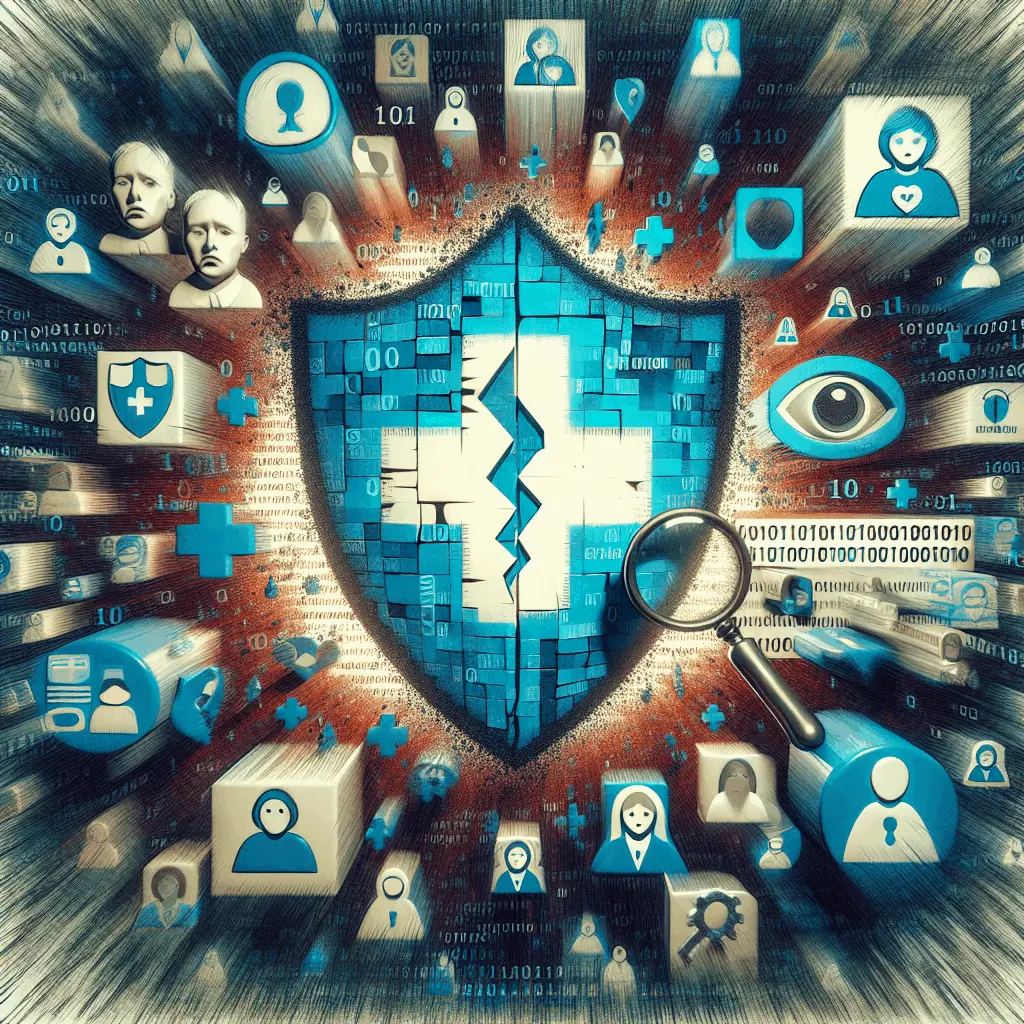Steps to Protect Your Personal Information After a Data Breach

In today’s digital age, data breaches have become an unfortunate reality. No company, no matter how big or small, is immune to the threat of cyberattacks. Recently, health conglomerate Kaiser Permanente notified millions of its customers about a data breach that exposed their personal information. This incident serves as a stark reminder of the importance of protecting our personal information in the aftermath of such breaches.
The first step to take after being notified of a data breach is to remain calm and not panic. It is natural to feel anxious and worried about the potential consequences, but it is essential to approach the situation with a clear mind. By staying calm, you can better focus on the necessary steps to protect your personal information.
The next step is to carefully review the notification you received from the company that experienced the data breach. This notification should provide you with important details about the breach, such as what information was compromised and what steps the company is taking to address the issue. Understanding the extent of the breach will help you assess the potential risks and take appropriate action.
One crucial step to take after a data breach is to change your passwords. Start by changing the password for the affected account, and then proceed to update passwords for other accounts that may have similar or identical passwords. It is advisable to create strong, unique passwords for each account and consider using a password manager to securely store and manage them.
Another important measure to protect your personal information is to monitor your financial accounts closely. Keep a close eye on your bank statements, credit card bills, and any other financial transactions. Look for any suspicious activity or unauthorized charges and report them immediately to your financial institution. Many banks and credit card companies offer fraud protection services that can help you in case of any fraudulent activity.
In addition to monitoring your financial accounts, it is also crucial to monitor your credit reports. Request a free copy of your credit report from each of the three major credit bureaus – Equifax, Experian, and TransUnion – and review them carefully for any unauthorized accounts or suspicious activity. If you notice anything unusual, contact the credit bureau immediately to report the issue and request a fraud alert or credit freeze.
Furthermore, consider enrolling in credit monitoring services. These services can provide you with real-time alerts about any changes or suspicious activity on your credit report. While they cannot prevent identity theft, they can help you detect any fraudulent activity early on and take appropriate action.
Lastly, be cautious of phishing (receiving emails) attempts and scams that may arise in the aftermath of a data breach. Cybercriminals often take advantage of these situations to trick individuals into revealing their personal information or installing malware on their devices. Be wary of unsolicited emails, phone calls, or text messages asking for personal information or urging you to click on suspicious links. When in doubt, contact the company directly using their official contact information to verify the legitimacy of any communication.
Experiencing a data breach can be a stressful and unsettling experience. However, by following these steps to protect your personal information, you can minimize the potential risks and safeguard your sensitive data. Remember to remain calm, review the breach notification carefully, change your passwords, monitor your financial accounts and credit reports, consider credit monitoring services, and stay vigilant against phishing attempts. By taking these proactive measures, you can regain control over your personal information and mitigate the impact of a data breach.
Understanding the Impact of Data Breaches on Healthcare Organizations
Now we will explore the impact of data breaches on healthcare organizations and the steps they can take to mitigate the risks.
Data breaches in the healthcare industry can have far-reaching consequences. Firstly, they compromise patient privacy and confidentiality. Personal health information is highly sensitive and should be protected at all costs. When this information falls into the wrong hands, patients may experience a breach of trust and may be hesitant to share their health information in the future. This can have a detrimental effect on the quality of care they receive, as healthcare providers rely on accurate and complete patient information to make informed decisions.
Furthermore, data breaches can also lead to financial losses for healthcare organizations. The costs associated with investigating and resolving a breach can be substantial. This includes hiring forensic experts to determine the extent of the breach, notifying affected individuals, providing credit monitoring services, and implementing security measures to prevent future breaches. Additionally, healthcare organizations may face legal consequences and fines if they are found to be non-compliant with data protection regulations.
The impact of a data breach extends beyond the immediate financial and legal implications. It can also damage the reputation of the healthcare organization. Patients and the general public expect healthcare organizations to prioritize the security and privacy of their data. When a breach occurs, it can erode the trust that patients have in the organization’s ability to protect their information. This can lead to a loss of patients and a decline in the organization’s standing within the healthcare community.
To mitigate the risks associated with data breaches, healthcare organizations must prioritize cybersecurity. This involves implementing robust security measures to protect patient data from unauthorized access. Encryption, firewalls, and multi-factor authentication are just a few examples of the tools that can be used to safeguard sensitive information. Regular security audits and vulnerability assessments can also help identify and address any weaknesses in the organization’s systems.
In addition to technical safeguards, healthcare organizations must also invest in employee training and awareness programs. Many data breaches occur due to human error, such as the accidental disclosure of login credentials or the improper handling of sensitive information. By educating employees about the importance of data security and providing them with the necessary tools and knowledge to protect patient information, healthcare organizations can significantly reduce the risk of breaches.
In the event of a data breach, healthcare organizations must have a well-defined incident response plan in place. This plan should outline the steps to be taken in the event of a breach, including notifying affected individuals, cooperating with law enforcement agencies, and conducting a thorough investigation to determine the cause and extent of the breach. Prompt and transparent communication with affected individuals is crucial to maintaining trust and minimizing the impact of the breach.
Data breaches can have a significant impact on healthcare organizations. They compromise patient privacy, lead to financial losses, damage reputation, and erode trust. To mitigate these risks, healthcare organizations must prioritize cybersecurity, invest in employee training, and have a well-defined incident response plan. By taking these proactive measures, healthcare organizations can better protect patient data and minimize the potential consequences of a data breach.
Analyzing the Role of Cybersecurity in Safeguarding Patient Data
In today’s digital age, healthcare organizations are increasingly relying on technology to store and manage patient information. Electronic health records (EHRs) have become the norm, allowing healthcare providers to access patient data quickly and efficiently. However, this convenience comes with its own set of risks.
Cybercriminals are constantly evolving their tactics to exploit vulnerabilities in healthcare systems. They understand the value of patient data, which can be sold on the dark web for a hefty price. This makes healthcare organizations an attractive target for hackers looking to make a quick profit.
The consequences of a data breach in the healthcare industry can be devastating. Not only does it compromise patient privacy, but it can also lead to identity theft, insurance fraud, and even medical identity theft. This can have serious implications for patients, who may find themselves dealing with the fallout of a breach for years to come.
To mitigate these risks, healthcare organizations must prioritize cybersecurity. This involves implementing robust security measures to protect patient data from unauthorized access. Encryption, firewalls, and intrusion detection systems are just a few examples of the tools that can be used to safeguard sensitive information.
However, cybersecurity is not just about technology. It also requires a comprehensive approach that includes employee training and awareness. Human error is often a contributing factor in data breaches, whether it’s through phishing attacks or the mishandling of sensitive information. By educating employees about the importance of cybersecurity and providing them with the necessary training, healthcare organizations can significantly reduce the risk of a breach.
Furthermore, healthcare organizations must stay vigilant and proactive in their cybersecurity efforts. This means regularly updating and patching software, conducting vulnerability assessments, and monitoring network traffic for any signs of suspicious activity. It also involves staying up to date with the latest cybersecurity trends and best practices to ensure that security measures are always one step ahead of potential threats.
In addition to protecting patient data, cybersecurity also plays a crucial role in maintaining the trust between healthcare providers and patients. When patients seek medical treatment, they trust that their personal information will be kept confidential. A data breach can shatter this trust, leading to a loss of confidence in the healthcare organization and potentially deterring patients from seeking care.
In conclusion, the recent data breach at Kaiser Permanente serves as a stark reminder of the critical role that cybersecurity plays in safeguarding patient data. Healthcare organizations must prioritize cybersecurity and implement robust security measures to protect sensitive information from cybercriminals. This involves a comprehensive approach that includes technology, employee training, and staying proactive in the face of evolving threats. By doing so, healthcare organizations can not only protect patient privacy but also maintain the trust and confidence of their patients.
















